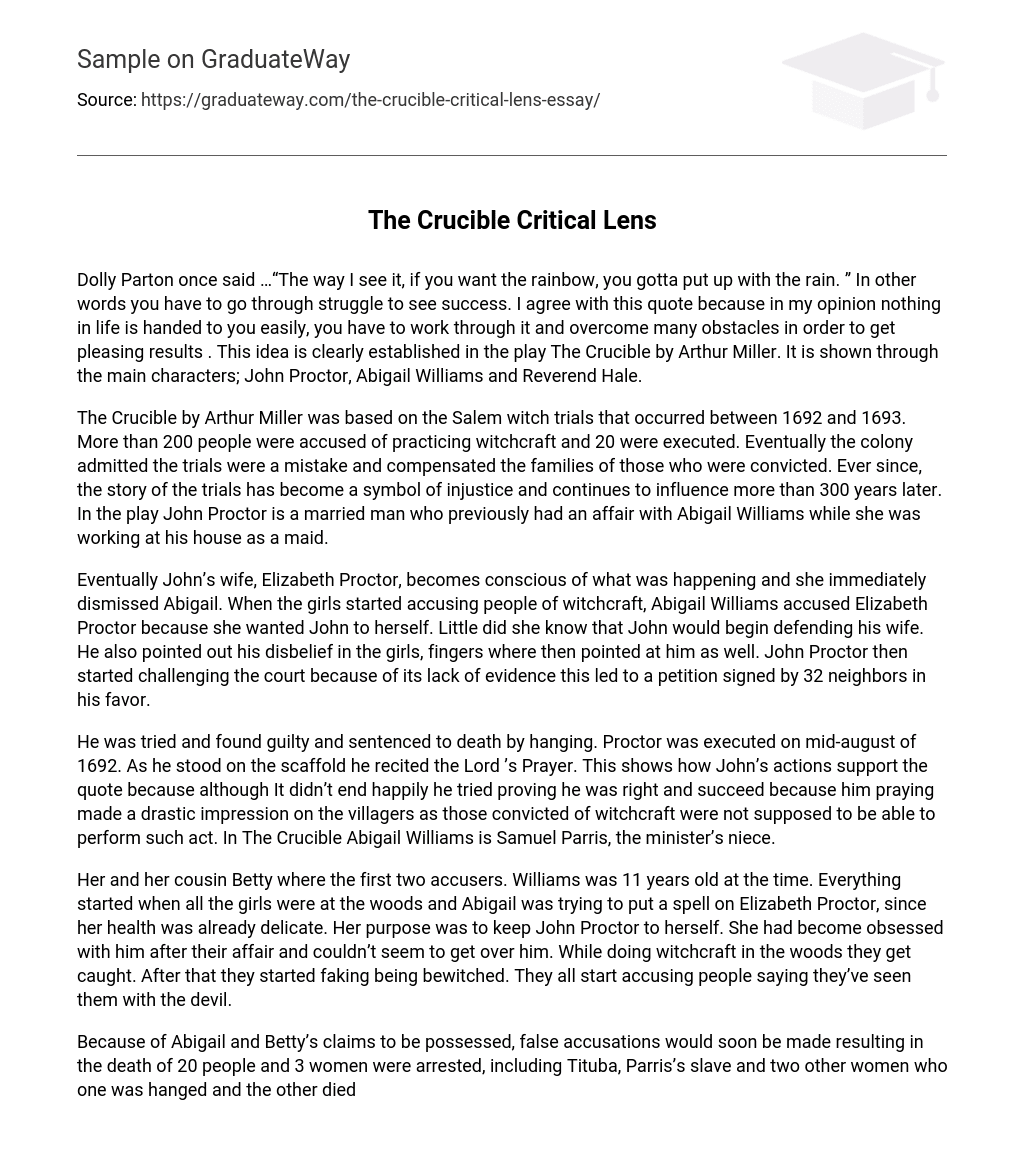Dolly Parton believes that in order to see the rainbow, one must first experience rain. This statement suggests that facing challenges is crucial for attaining success. I personally agree with this notion because I believe that achieving satisfactory outcomes in life necessitates hard work and overcoming obstacles. Arthur Miller’s play, The Crucible, skillfully portrays this idea through its primary characters: John Proctor, Abigail Williams, and Reverend Hale.
The Crucible, a play written by Arthur Miller, is based on the notorious Salem witch trials that occurred from 1692 to 1693. During this period, more than 200 individuals were accused of practicing witchcraft and a total of 20 people were put to death as a result. Eventually, the colony admitted that the trials had been a mistake and provided compensation to the families of those who were unjustly convicted. This tragic incident has become emblematic of injustice and maintains its significance even after over three centuries have passed. Within the play’s narrative, John Proctor, a married man, engages in an extramarital affair with Abigail Williams while she serves as a maid in his household.
Elizabeth Proctor, John’s wife, ultimately discovers the situation and promptly sends Abigail away. The girls make false accusations of witchcraft, with Abigail specifically targeting Elizabeth in order to be with John. However, she did not anticipate John standing up for his wife or questioning the credibility of the girls. This behavior raises suspicion among others and leads John to doubt the court’s legitimacy due to insufficient evidence. Consequently, 32 neighbors sign a petition in support of him.
John Proctor was tried, found guilty, and sentenced to death by hanging in mid-August of 1692. While standing on the scaffold, he recited the Lord’s Prayer, which showcased his efforts to prove his righteousness. This successful act left a lasting impression on the villagers, as those accused of witchcraft were deemed incapable of such actions. Consequently, Proctor’s prayer had a dramatic impact.
In The Crucible, Abigail Williams assumes the role of Samuel Parris’ niece and serves as the minister.
Both Abigail and her cousin Betty were the initial accusers, with Abigail being 11 years old at the time. The events unfolded at the woods where Abigail attempted to cast a spell on Elizabeth Proctor due to her already fragile health. Abigail’s intention was to claim John Proctor for herself, as she had developed an unhealthy obsession with him following their affair and couldn’t move on. Their illicit activities in the woods led to their capture, after which they began pretending to be bewitched. This led to a cascade of accusations, with all of them claiming to have witnessed people consorting with the devil.
Due to the claims made by Abigail and Betty about being possessed, a chain of false accusations arose, resulting in the tragic death of twenty individuals. Among those affected, three women were arrested, including Tituba who was a slave owned by Parris. Furthermore, one of these women was hanged while the other passed away while incarcerated. This serves as a testament to Abigail’s boundless cruelty, as she showed no concern for the lives of innocent people if it meant concealing her own involvement in witchcraft activities within the woods. Abigail went to great lengths to maintain her reputation as a victim and succeeded in doing so.
Reverend Hale, a young minister, has extensively studied witchcraft with the intention of eradicating it in the name of God. He was called upon by Salem’s minister, Samuel Parris, to examine Betty Parris. Reverend Hale is tasked with identifying individuals marked by the devil for the witch trial. However, witnessing the atrocities committed during the trial and the disregard for human rights and justice, Reverend Hale voices his moral opposition to Judge Danforth. Subsequently, upon hearing Mary Warren accuse John Proctor of witchcraft, Reverend Hale decides to leave the court.





